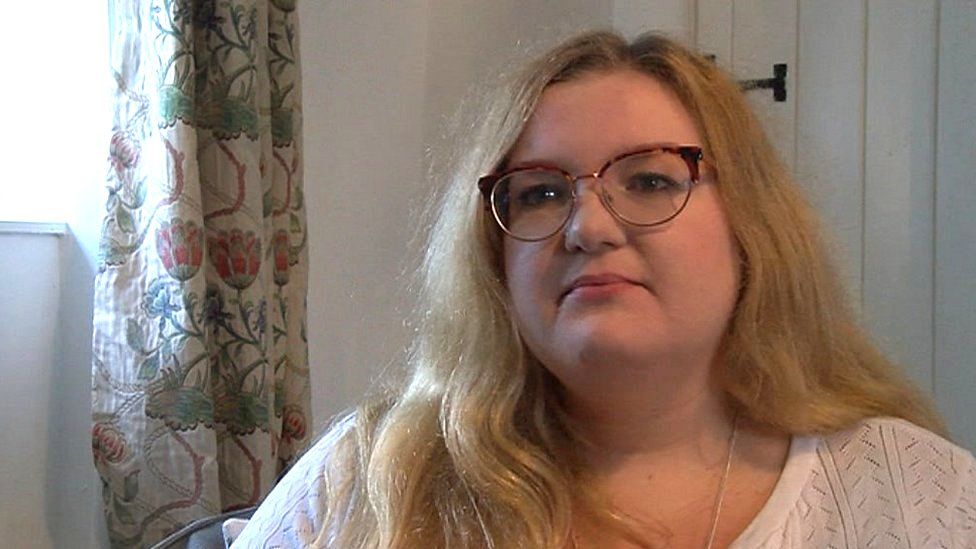ARTICLE AD BOX

Emily Barley, whose daughter Beatrice died in 2022 at Barnsley Hospital, is backing the call for a full inquiry
By Tim Dodd and PA
BBC England
Families whose babies have died or been harmed in the care of NHS are calling for a statutory public inquiry into England's maternity services.
The Maternity Safety Alliance has written to Health Secretary Steve Barclay following repeated scandals.
Reports into a number of NHS trusts have revealed poor levels of care and concerns over culture.
The government said £165m had gone into improving neonatal services each year since 2021.
The families argue that only a judge-led, statutory public inquiry can command the confidence of families and arrive at conclusions "free of party politics".
In August, the public inquiry into how nurse Lucy Letby was able to murder seven babies was given statutory powers, meaning it will be able to compel witnesses to give evidence.
The Maternity Safety Alliance say their babies "are too precious to keep on ignoring the reality that, despite a raft of national initiatives and policies implemented in the wake of investigations and reports, systemic issues continue to adversely impact on the care of women and babies".
The letter is signed by parents who lost their babies under NHS care.
Among them is Emily Barley, whose daughter Beatrice died in 2022 at Barnsley Hospital after staff mistakenly monitored her heart rate instead of the baby's.
Signatories also include Jack and Sarah Hawkins, who highlighted failings at Nottingham University Hospitals NHS Trust following the death of their daughter, Harriet, and national patient safety campaigner James Titcombe, whose son Joshua died at Morecambe Bay.
Sarah Hawkins and her husband Jack were instrumental in bringing to light failings at Nottingham University Hospitals NHS Trust
Previous investigations into maternity services include those for Morecambe Bay, which found 20 major failures, Shrewsbury and Telford which found catastrophic failures may have led to the deaths of more than 200 babies and nine mothers and East Kent which concluded dozens of babies might have survived if they had received better care.
Donna Ockenden, who led the review at Shrewsbury and Telford, is currently leading an independent review of maternity services at the Nottingham University Hospitals NHS Trust.
Parents in Leicester have also called for an independent review into its maternity units following the deaths of their babies.
Ms Barley told the PA news agency that local-level inquiries were useful but maternity failings were "not isolated problems, it's a system-wide problem".
She said the culture within the NHS was one of the biggest issues, including the focus on "reputation management".
She pointed to "a kind of cultural acceptance of failure, an inevitability, even when it's avoidable".
Mr Titcombe said: "It's clear that future inquiries at an individual service level will only ever get us so far - no matter how many we have."
He added a national inquiry could assess the whole system, examine the impact of previous inquiry recommendations and study international examples of safer maternity systems "and what we could learn from them".
'Indifference and intransigence'
Lawyer Jane Williams, who acts for families involved in the Nottingham review, said it had highlighted "systemic failings in obstetric care across the country and the need for lessons to be finally learnt and recommendations implemented to improve the safety of maternity care".
She said bereaved families she has worked with over decades "have had enough of the ongoing indifference and intransigence to what is horrendous failings".
She added: "Despite inquiry after inquiry, apology after apology and a slew of litigation, neither the NHS or the government appear willing to tackle the real issue - a root-and-branch rethink of what young mothers and families want at one of the most stressful points in their lives. A statutory public inquiry would hopefully secure this once and for all."
A Department of Health and Social Care spokesperson said every parent deserved to feel confident in the care they and their baby receive, and that they welcomed the Care Quality Commission's commitment to monitoring trusts that are "not providing an adequate standard, to ensure improvements are made".
"Nationally, we have invested £165m a year since 2021 to grow the maternity workforce and improve neonatal services and we are promoting careers in midwifery by increasing training places by up to 3,650 over the past four years," they said.
"The Care Quality Commission is also currently inspecting all NHS acute hospital maternity services that have not been inspected and rated since April 2021."

 1 year ago
36
1 year ago
36








 English (US) ·
English (US) ·